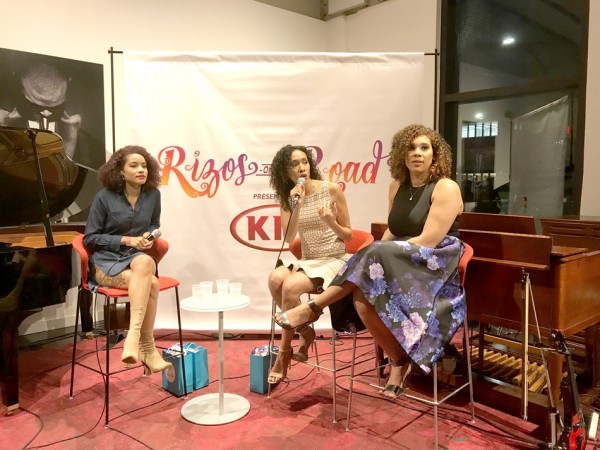Afro-Latinas take to the road to talk hair care and heritage
14th June 2017 · 0 Comments

Devri Velázquez, Rocio Mora and Ada Rojas discuss the Afro-Latina Experience at the recently held event RisasRizos. | Photo by Prinsey Walker
By Prinsey Walker
Contributing Writer
Ada Rojas and Rocio Mora did not know how to deal with their hair – thick, curly mixes of Latino and African roots.
In school, friends complimented them when they straightened their hair. However, through flat ironing, they lost their identities. Now, with the help of a Kia Motors America multicultural outreach project called Kia Latino, New York-based Rojas, creator of “All things Ada,” and Mora, who lives in New Orleans and is the creator of “RisasRizos,” are traveling the country to help Afro-Latinos embrace their hair and their African heritage.
Natural and curly-haired members of the Latino and African-American communities gathered at The Peoples Health Jazz Market on May 12 for “Rizos on the Road,” the second stop of a six-city tour hosted by Rojas and Mora. The campaign is part of Kia’s effort to engage more diverse consumers, as the automaker has seen its highest increase in sales each year from minority millennials.
Rojas and Mora have not always identified as members of the Afro-Latino community, they told the audience. Neither of their families identified with their Black roots, according to the two. “I took an Afro-Caribbean course in college and that class literally changed my life,” Rojas said. “I remember sitting in class and being like, ‘Wow I am Black.’”
Rojas said she wants people to learn about their ancestry to understand who are they are. “It is okay to be Black, it is okay to be both,” she said.
Mora said she began identifying as Afro-Latina because her grandmother was of African descent. “I come from a very mixed family. There are a variety of races. But not all races respect or embrace other races,” she said. In Mora’s family, she said, being Black is not the accepted nor embraced culture. “There are a lot of people I know who do not accept being Black and Latino. There needs to be more conversation on this topic.”
In New Orleans, Mora said that there are not enough people who see themselves as Afro-Latino. “There are Latinos who do not identify with being Black and then those who are Black and not seen as being Black by the African-American community,” she said. “It is about bridging that gap.”
People would be able to understand the Afro-Latino community if they were better represented in the media, Mora said. She added that most people think of the typical Latina to look like “Modern Family” actress Sofia Vergara: “Straight hair, thick, and having a light complexion,” she said. “A woman who is Black and Latina is not represented enough. There needs to be more people of color who are Latinos who are in movies and commercials so that we could become more familiar to that.”
Rojas also wants more representation of Afro-Latinas. “With tours like this, we are trying to educate people and enlighten people,” Rojas added. “The more we educate ourselves, the more people will be able to understand, ‘Oh you’re Black and you speak Spanish.’”
The “Rizos on the Road” event attracted women with natural hair, who learned about the latest products and hair tips to help embrace their “rizos,” which means “curls” in Spanish. Ona Diaz-Santin, a New Jersey stylist, gave the audience tips on how to find the right salon.
“Before sitting in someone’s chair, they need to know who you are and observe your look,” Diaz-Santin said.
The stylist also described the best way to maintain a hairstyle.
“You can preserve your hair for five days by sleeping on a silk or satin pillowcase,” Diaz-Santin explained. Chissel Espinal, a New Orleans stylist, added that tying the hair with silk or satin fabric is another method to protecting hair at night.
Local African-American residents in New Orleans said they also found the conversation of natural hair important. Paula Bland, the owner of The Love of People, showcased her natural hair products to event-goers. Bland, a vlogger on Youtube who hosts “Naturally Greer,” said she appreciated the work that Rojas and Mora are doing for the Latino community. “Talking about the dynamics of natural hair in Louisiana, we need more of a light shined in this environment here,” Bland said.
Allison Rucks, the owner of Allie’s Natural Hair Community, said she attended the “Rizos on the Road” event because she wanted to know what issues the Latino community faced in dealing with curly hair. Rucks said her products were used on the set of the WGN series “Underground,” filmed in Baton Rouge, La.
“Hair is hair, we have all experienced not being able to find the right product. That goes across the board for all women,” Rucks said.
The blogs “All things Ada” and “RisasRozas” combined, have 20,000 followers, and are Tecla award-nominated influencers, Rojas said. However, they both continue to serve their community. “We love creating content for this community that has been underserved for so many years,” she said.
Juana Mora, Rocio Mora’s mother, said that she did not believe that her daughter’s blogging journey could turn into a service that would start a conversation within the community.
“When she started blogging, I thought she was crazy,” Juana said. “People straighten their hair and are hiding their beauty. She is showing them to not be afraid to wear their hair.”
In addition to receiving gift bags with hair products from some of the leading natural hair care brands, such as As I Am, Curls and Shea Moisture, the event in New Orleans also featured complimentary scalp massages as well as an exchange of new and gently used hair care products.
This article originally published in the June 12, 2017 print edition of The Louisiana Weekly newspaper.



